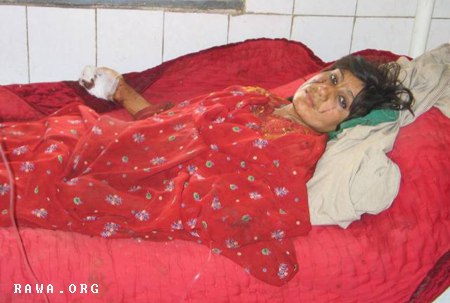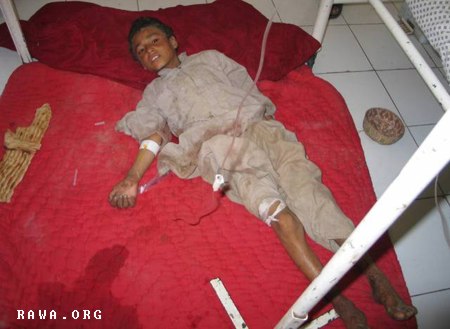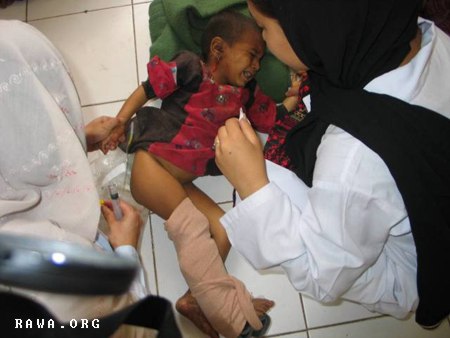GIRISHK, Afghanistan -- Afghanistan's President Hamid Karzai Sunday ordered a probe into civilian casualties from a foreign military airstrike three days ago, which elders said had killed at least 45 villagers.




RAWA Photos: Civilian Victims of Girishk air strikes by NATO on June 29, 2007. 45 civilians, many of them women and children, were killed. Photos are taken from Bust Hospital where some injured have been taken.
The elders said they had recovered the bodies of 45 civilians, mostly women and children, from the airstrike Friday, which was aimed at Taliban fighters in Girishk town in Helmand province, district chief Dur Alisha said.
"People are digging under the rubble for more bodies. There's a possibility that more people might be under debris," Alisha said.
Karzai had dispatched a team of government officials and parliamentarians to the remote area to investigate, his office said.
The toll from the elders, if corroborated, would be the highest number of civilians killed in a single military strike since 2002. That strike came one year after the extremist Taliban movement was ousted from power in a US-led offensive.
The elders said 23 more civilians were wounded and 62 Taliban fighters killed, Alisha said.
There have been conflicting claims about the toll. Estimates from North Atlantic Treaty Organization's (NATO) International Security Assistance Force (ISAF) and the US-led coalition in Afghanistan, which are fighting a Taliban insurgency, are lower.
Police said 25 civilians were killed in airstrikes in the same area a week ago, including nine women and three young children.
A suicide bomber meanwhile blew himself up Sunday against a NATO convoy in Girishk, Alisha said, leaving two Afghan passersby wounded.
A third was hurt in gunfire by soldiers after the attack, an Agence France Presse photographer in the town said.
The British deployment that covers Helmand as part of ISAF said there was an incident, but it had no other details.
President Karzai has led criticism of the foreign forces over civilian deaths in military operations against Taliban fighters and their allies, including Al Qaeda.
Last week he accused the foreign forces of "the extreme use of force, the disproportionate use of force to a situation, and the lack of coordination with the Afghan government."
His comments came after 10 days of heavy fighting, which he said had left about 90 civilians dead.
Some 380 civilians have been killed in insurgency-linked violence this year, about half in Taliban attacks and half in foreign military action, the Afghanistan Independent Human Rights Commission said Sunday.
"In the recent few attacks there are more from the international forces, but, in general, one could say they are balanced in killing," commissioner Nader Nadery said. The commission registered about 700 civilian deaths last year.
The casualties had left Afghans increasingly frustrated, and had undermined the international effort to defeat the Taliban, Nadery said.
"Unless there is more coordination, unless there is immediate compensation to families affected, and proper investigations, we would not be able to win this war against the Taliban.
"The Taliban would very much misuse this evidence, play with it, and provoke the community against the government and international forces," he said.
There have been calls for the foreign forces to reduce their use of air power to minimize civilian casualties.
But ISAF says it does not have enough troops to put on the ground, where they would also be at a disadvantage because they do not know the terrain.
"This is what the Taliban want to do, to stop us from using air strikes and to force us onto the ground," an official said on condition of anonymity.
"If we are not able to use air, they will have won a big battle." -AFP



